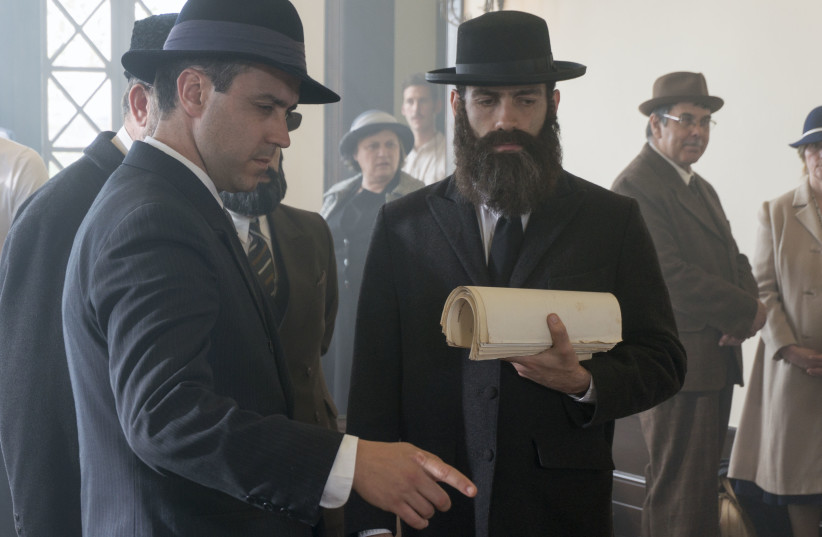The founder of the Oporto Portuguese Jewish community, who has been called “the Portuguese Dreyfus,” is the center of yet another campaign, headed by its current leaders. One hundred years after its founding in 1923, the community is campaigning for the Portuguese state to posthumously reinstate its founder into the army, after he was unjustly expelled because of practicing Judaism.
Arthur Carlos Barros Basto was a Portuguese Army officer who was declared “immoral” in June 1937 for helping returning descendants of Jews to become circumcised.
This is yet another campaign by the Oporto Jewish community in the past few years since it came into the spotlight as result of an amendment in the local law that offered descendants of Jews from around the world the chance to apply for citizenship.
The push to reinstate "the Portuguese Dreyfus" into the army
Three weeks ago, the community called on the European Commission to instigate an impartial international investigation into “an antisemitic action that took place in Portugal using robbers, murderers and convicts who intended to defame the country’s strongest Jewish community, destroy Jewish leadership, halt the influx of Israeli citizens and end the law that granted Portuguese citizenship to Jews of Portuguese origin,” according to Gabriel Senderowicz, Oporto Jewish community’s president.
Leading the efforts of this current campaign is Cpt. Basto’s granddaughter, Isabel Barros Lopes, who is continuing her mother and grandmother’s efforts to have him posthumously reinstated but has so far been unsuccessful.

“It is incredible, but the state is now claiming that my grandfather needs to be alive, aged 136, and can only receive the posthumous reinstatement if he requests it personally,” said Barros Lopes who also happens to be the vice president of the Jewish Community of Oporto.
According to a press release by the community, for decades, it was largely only Cpt. Basto’s closest relatives who fought against the injustice. However, in 2012, at the request of Barros Lopes, the Portuguese parliament stated that Cpt. Basto had been the target of “political and religious persecution,” and advised the government to “reinstate him into the Portuguese Army.”
The following year the Army officially declared that Cpt. Basto could be posthumously reinstated as colonel, the rank he would have reached on November 2, 1945, had he not been expelled.
Even though the parliament and the army have announced these decisions, Barros Lopes said that she hasn’t received any document stating her grandfather’s official reinstatement into the Army. “Words and declarations are not enough. We demand that this chapter ends with a full and official posthumous reinstatement of my grandfather into the Portuguese Army, with no more excuses,” she said.
“Words and declarations are not enough. We demand that this chapter ends with a full and official posthumous reinstatement of my grandfather into the Portuguese Army, with no more excuses.”
Isabel Barros Lopes
David Garrett, a member of the Board of the Jewish Community of Oporto who is in charge of legal affairs, explained this week that “at present, the problem is not the Portuguese Army, but various state institutions, which try to deny any descendants’ legitimacy to apply for the posthumous reinstatement, as if the person on whose behalf they are fighting for is immortal, despite a law passed in 2018 which allows for posthumous reinstatements.”
He added that “if we do not receive an answer within the next few weeks we will lodge a complaint with the Portuguese Administrative Court, and if necessary, afterward also to the European Court of Human Rights.”
According to historic documentation, Cpt. Basto officially converted to Judaism in 1920 and founded the Jewish Community of Oporto together with about thirty Ashkenazi Jews. Between the years 1927 and 1934, Basto tried to help thousands of descendants of forcibly converted Jews, known as Bene Anusim (Conversos), who lived in Portugal to convert to Judaism.
Barros Lopes explained that her grandfather established a yeshiva, a Jewish school, created a Jewish newspaper and “asked Sephardi Jews around the world to pay for the construction of a large synagogue in Oporto,” still considered the largest synagogue on the Iberian Peninsula.
Yet in 1937, Cpt. Basto was the target of anonymous letters sent to the Portuguese authorities falsely accusing him of homosexuality. The police declared such accusations to be false, “but the State took advantage of the controversy and instead, he was expelled from the army for helping his students receive a Jewish circumcision,” official documentation by the community has stated.
Barros Lopes shared that after her grandfather was expelled from the army, “he spent the end of his life filled with bitterness and sadness.”

In 2019, the Jewish Community of Oporto financed the filming and production of a feature film titled Sefarad, which tells the story of the captain, who has been called “the Portuguese Dreyfus” and which can be viewed on Vimeo.
The Jewish Community of Oporto says it nowadays comprises around one thousand Jews who originate from 30 countries. The community has three synagogues, a Holocaust Museum, a Jewish Museum and kosher restaurants. Interestingly, this year, the community will inaugurate its own cemetery, with the last one destroyed in 1497 at the time of the Edict of King Manuel I when the entire Portuguese Jewish community was forcibly converted and Judaism was banned in Portugal.
